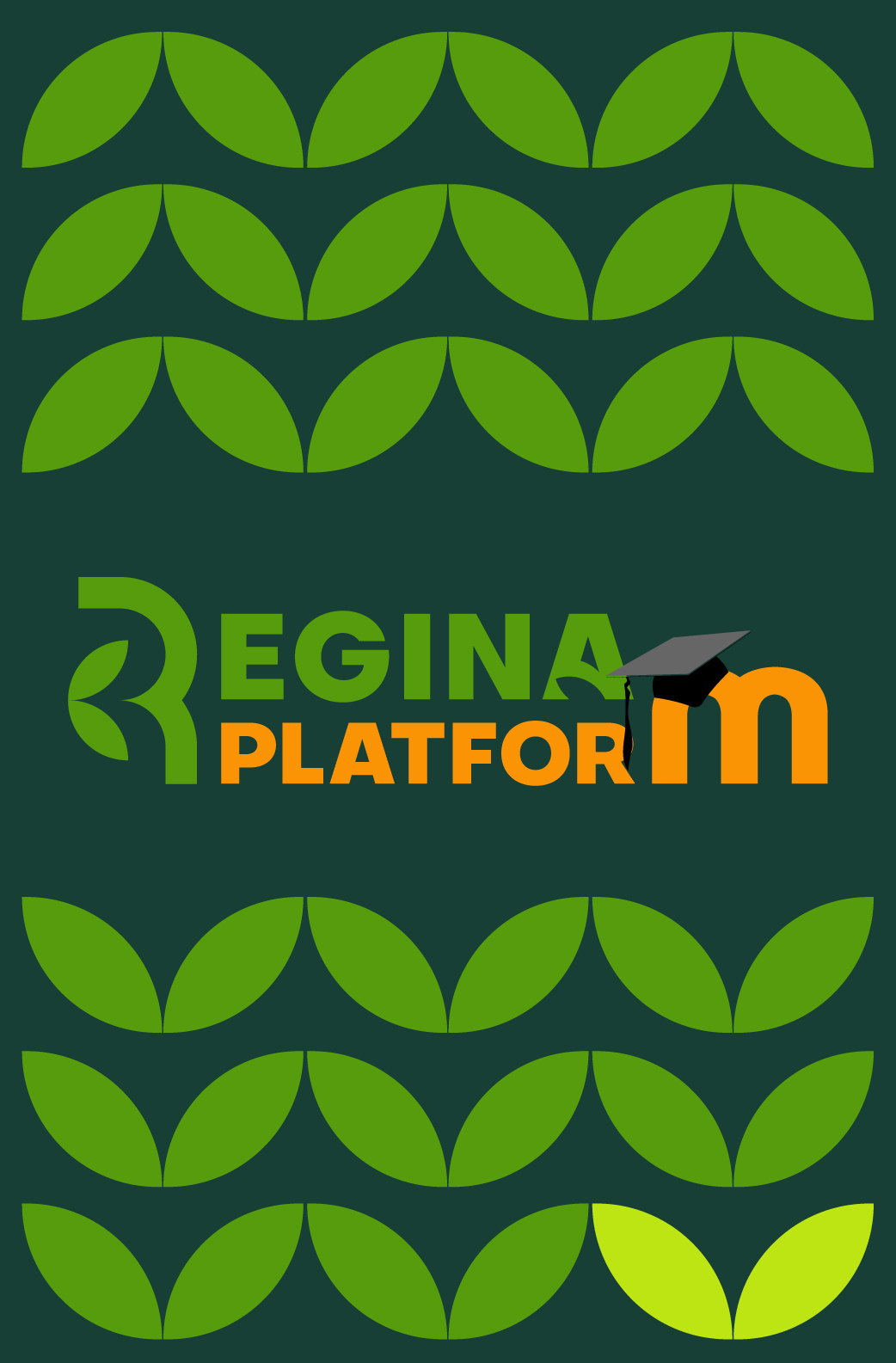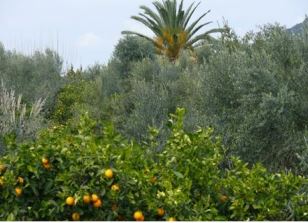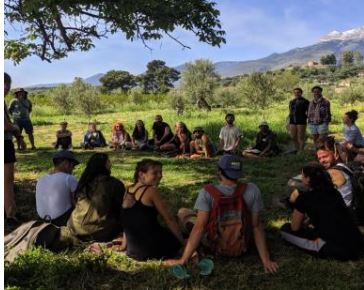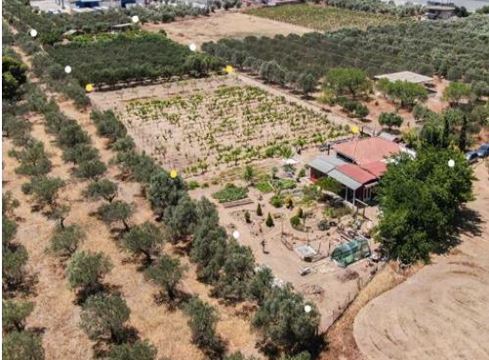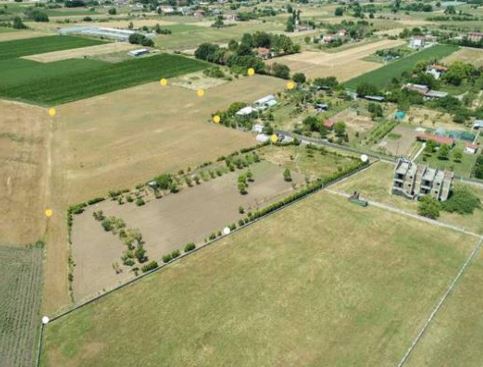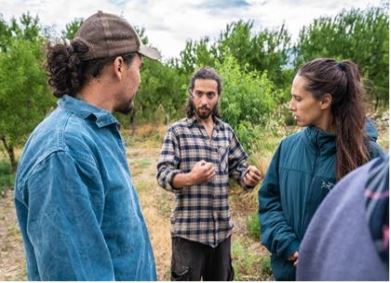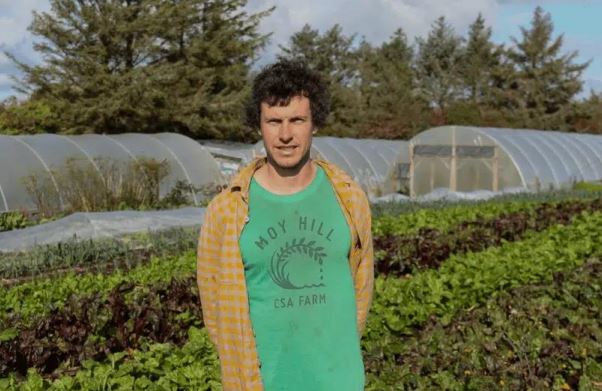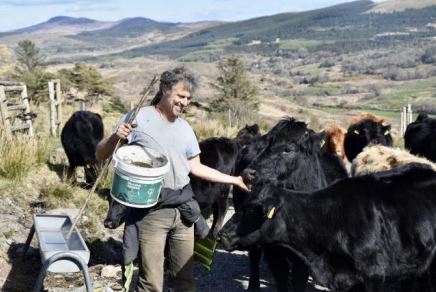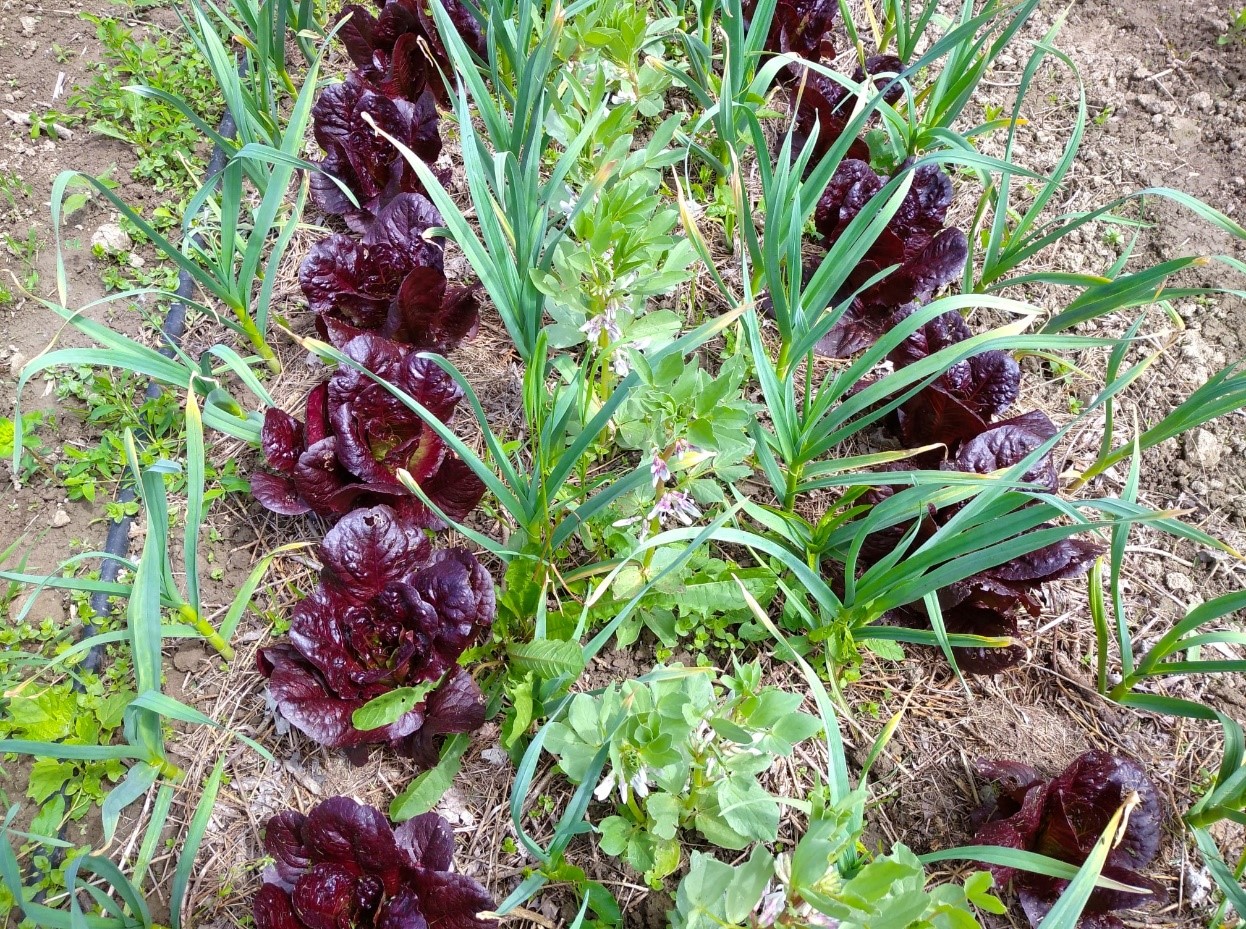Categories
Vegetables/fruits
The Southern Lights Pilot Farm
Success Story
Since 1985, the farm has been implementing advanced organic farming, applying practices such as green fertilisation, fragmentation of branches and introduction into the soil, and increasing biodiversity. The next generation of the family-owned farm decided to go a step further, when they noticed that in their farm the forest started to grow while in the surrounding mountains the forest did not return 11 years after the wildfires that had destroyed it. Sheila, the daughter of the original farmer who had decided to apply advanced organic farming since 1985, together with other family members, started researching into the concept of regenerative agriculture and the agroforestry principles and methods, receiving training abroad, and started to implement RA methods on the farm systematically 7 years ago. Today she is sharing the benefits of the transition to RA, ranging from working on a farm with increased biodiversity and the therapeutic effects this has, the financial security that comes from an increased farm resilience, and the new commercial opportunities available in other sectors (e.g. tourism), to the personal satisfaction for contributing to the fight against climate change and the sense of belonging to a wider network of like-minded persons. Southern Lights participates as a partner in an important project to promote Regenerative Agriculture in Greece. The project was launched in 2021 in order to bring Regenerative Agriculture to Greece and has created 6 pilot farms in different areas of Greece and with different crops, while offering through its website www.regenerativefarminggreece.org important information and educational material for Regenerative Agriculture.
Labels: Greece, organic, vegetables/fruits, agroforestry, biodiversity
Haris Vassiliou
Success Story
Haris started to research about RA after he graduated as an Agronomist, because he wanted to produce more environmentally friendly products and was looking for a more interesting way to cultivate besides just using fertilizers and chemical input. His vision is that his farm looks like a forest with tall and productive trees, each season having its own fruits and vegetables, and being able to wander around and pick up something to eat on the spot. He took part in the Regenerative Farming Greece project (http://regenerativefarminggreece.org/) and his pomegranates farm is a pilot farm, receiving support from experts in terms of the design of the farm and RA practices. He believes in the effectiveness of the RA approach and is really looking forward to the results.
Labels: Greece, vegetables/fruits, green fertilisation, wood shredder
Farm “GERANIA”
Success Story
The journey of Giorgos Foufas towards RA started 35 years ago when, after he graduated as an agronomist, he decided to implement ecological farming following Steiner’s standards for organic farming and the philosophical views on land cultivation by Masanobu Fukuoka: “We cultivate to heal ourselves with the food that becomes our medicine, and on the other hand we heal the earth and connect with it, thus having a two-way relationship”. Today, 26 years after starting to implement RA methods, although he recognises the obstacles related to the soil and climate conditions (climate change, urbanisation) as well as social factors, Giorgos Foufas is in constant search for sustainable solutions in alignment with the climate developmnets and believes that RA is a dynamic process where changes, small or bigger, are integrated into the development cycle.
Labels: Greece, organic, vegetables/fruits, Masanobu Fukuoka, biodynamic process
EcoGAIA Farm
Success Story
After working for many years with agroecological farming methods in an effort to bring back lost flavours in food and changing the farming approach so that they would be able to continue to grow quality food in the years to come, Alexandros and Natasa joined the Regenerative Farming Greece project (http://regenerativefarminggreece.org/ ) and received support in order to make the transition to RA both in terms of the farm design and the farming practices. Today they apply RA practices and are optimistic about the results of the transition to RA.
Labels: Greece, vegetables/fruits, alley cropping, syntropic garden
COB Farm
Success Story
The COB team implements projects on a range of fields, with a common aim: to explore and generate solutions for reducing our footprint on the environment. Their fields of activity include building with natural materials, farming through techniques of permaculture and RA, educating, networking and informing. The COB farm entered the Regenerative Farming Greece project and received support from experts in terms of the farm design and farming techniques towards the transition to RA.
Labels: Greece, vegetables/fruits, activated carbon, green fertilisation
Moy Hill Farm
Success Story
Introduction to Moy Hill Farm
Fergal and Sally run an 80-acre mixed regenerative farm on the west coast of Ireland. Fergal grew up on an organic market garden farm in Mayo where he learned about the importance of soil health and farming with nature. After a few years of travelling and surfing around the world, Fergal returned and started his own farm near the surfing town of Lahinch in County Clare, where he now lives with his young family.
Moy Hill Farm contains a mixture of livestock – cows, sheep and hens, and grows about 25 different crops in their “No Dig” Market Garden. They sell a variety of fresh produce at markets and to local restaurants.
Regenerative Agriculture Training
Fergal and Sally began farming regeneratively in 2017 after learning about the methods in a Holistic Management course provided by the Savory Institute, an agricultural research organisation with hubs across the world. Here, they learned how to sustainably manage livestock and how to plan the year ahead to ensure fresh pasture year-round, reducing feed and fertiliser costs. Since then, Fergal has engaged in many trainings, such as a regenerative farming course run by expert Richard Perkins and the Irish National Organic Training Skillnet. He said it is inspiring to learn about farmers from around the world engaging in regenerative agriculture through these trainings and events.
Using Livestock to Regenerate the Land
Fergal described how animals are key for regenerating large areas of land. He views his way of farming as managing ecosystems, protecting and enhancing habitats, and focusing on diversity. Fergal manages his animals so that they benefit, not harm, the environment around them.
Livestock are put into small paddocks and moved daily onto fresh pasture. This rotation cycle, called “mob grazing”, allows for areas of grassland to rest and recover in the periods where they are stockless. Plants are left to “fully express themselves, which allows for the other habitants of the farm, such as insects and birds, to thrive as a result. Fergal believes that he can regenerate hundreds of acres of land with the help of livestock (cows, sheep, poultry) and regenerative management practices.
Regenerative Verification
Every year, Moy Hill farm get an EOV “Ecological Outcome Verification” assessment on their land which verifies that their soils are getting healthier. The EOV surveyors monitor every field on the farm to ensure all environmental indexes are going up. Fergal described how this EOV verification is a simple way of holding regenerative farmers accountable, as it will prove whether they are regenerating their land and making a positive impact.
No Dig Market Garden
Fergal and Sally follow the regenerative practise of minimum disturbance of the soil. Their market garden is not tilled or dug, in an effort to protect the soil’s structure and biodiversity. Up to 25 different crops are grown on their market garden such as salads, kale, beetroot, beans, tomatoes, squash, courgettes, peas, turnips, leeks, onions, and garlic. Their salads are the best seller as local restaurants and shops are in constant demand for fresh, local lettuce.
An Ode to the Past
Fergal described how the way he farms now, is very similar to how traditional farms in Ireland were managed many years ago. Most farms used to have a vegetable garden, poultry, and it was common to have a mixture of livestock, whilst sewing native trees and orchards. Regenerative Agriculture is therefore, as Fergal described, not a “new” concept. It is all about farming in a way that makes sense for the local environment and for the farmers themselves. Fergal and his family benefit from fresh produce and an outdoor lifestyle that is in tune with nature. He describes farming this way as a “labour of love” and “being part of a bigger picture”, whilst also creating a healthy life for himself and his young family. The work of regenerative agriculture never stops, but this makes for an exciting challenge for Fergal.
An Affirming Experience – Farming with Intention
Fergal and Sally believe in “farming with intention”, and that diversity across their farm is key to its health and long-term success. While they are not receiving any financial support to farm regeneratively, indeed the training and EOV certification is costing them money, they are able to grow high quality food and thus market their products at a higher price. Fergal noted how he has been experiencing the ecosystem on his land ‘thrive’ since implementing RA practices, and he spoke about how this is an affirming experience for himself and his family.
LABELS: Ireland, Livestock, Organic, Vegetables/fruits, Green Fertilisation, agroforestry, biodiversity
Derry Duff Farm
Success Story
Derry Duff is a 54-hectare farm, established in 2008 and located by the wild Atlantic Ocean. Steve and Claire integrated regenerative practices into their farm from the start and attained organic status in 2010 due to the mandatory 2-year conversion period. Regenerative Agriculture is similar to Organic Farming in many ways, as it uses no chemical inputs such as synthetic fertilizers, pesticides or herbicides. Regenerative Farming is a term for a range of sustainable farming practices that farmers can implement on their land, with a large focus on improving the health of the soil, biodiversity, nutrient cycling, water quality and reducing greenhouse gas emissions.
Derry Duff is unlike other Irish farms, as their main crops are organic Blueberries and Aronia Berries, both grown for their nutritional properties. Once harvested, the berries are made into health food products and drinks. The rugged mountainous landscape of the Derry Duff West Cork farm is unique, filled with native species such as heather, birch and alder. Steve and one other worker permanently farm, with temporary volunteers coming to stay and help for a few months at a time.
Derry Duff farm is certified with the Irish Organic Association and they abide by a range of sustainable farming practices. Instead of using chemical nitrogen fertilizer, clover and herbs have been mixed into grass swards to fixate nitrogen naturally. They use no pesticides or herbicides so weeding is done manually. Native trees and shrubs have been planted around the edges of several small ponds, to act as an absorption layer between the paddocks and the water, reducing the risk of pollution to the water.
Derry Duff is home to many animals, with a small herd of 18 organic dexter cattle who roam the wild mountainous landscape alongside the chickens. Derry Duff excellently integrates animals with the land, ensuring that their animals benefit, rather than harm, the environment. The farm also has a Tree Nursery and Steve and Claire are experimenting with Agroforestry; whereby native trees are planted within grazing land to provide nutrients for the soil and shelter for the animals.
An apple orchard of 80 trees is inhabited by free range chickens, who roam around the young apple trees. This integration of animals with trees is a feature of Regenerative Agriculture. For example, the chicken scratches around the radius of the trees, keeping the area clear from weeds, as well as providing precious natural fertilizer!
Steve and Claire’s goal since starting their farm was to make it more beautiful, and to do so in a way that was in harmony with the hills and natural landscape. Steve’s knowledge of regenerative agriculture was entirely self-taught and refined through trial-and-error. Steve believes that much of regenerative farming is “common sense”, and he enjoyed this trial-and-error that came with implementing regenerative practices, coming from a scientific background himself.
Steve has seen a variety of benefits from Regenerative Agriculture, such as:
- Economic benefits: they can market their products as higher quality than standard.
- Land management: the cattle aid in the management of the tricky hilly landscape.
- Improved soil: the Aronia plant has deep roots that penetrate the clay subsoil which promotes nutrient cycling and regenerates the soil.
- Increased Biodiversity: due to diverse habitats, wildlife corridors, and no destructive farming practices on the farm.
There were a few downsides for Steve, such as the manual work from weeding by hand and a lack of funding for Regenerative Agriculture practices. Overall, Regenerative Agriculture is working excellently for Steve and Claire’s farm, and they intend to explore further regenerative practices into the future.
LABELS: Ireland, Livestock, Fruits, Organic, Green Fertilisation, Biodiversity, Agroforestry
Dunasziget Vegetable Producing Community
Success Story
Field size (ha): 3 ha of which 6000m2 is horticulture, 600m2 is greenhouse, the remaining area is meadow and pasture. The farm grows 50 species of vegetables and 25 to 30 species of fruit. Seasonality is a high priority, as it guarantees that fresh seasonal vegetables get into the baskets of the community members.
Medicinal and aromatic herbs, a stretch of forest - oak, ash, elm gallery forest, acacia, willow, poplar, hornbeam, cover crops and multifunctional field margins.
The 8-course rotation is used for vegetable production. The practices applied in crop protection are: crop combinations, resistant species, sulphur fungicides, row covers (net or veil) against potato beetles. Products containing humic acid (authorised in organic farming). Post-harvest mulching is used to promote the decay of crop residues. Shallow cultivation is used, with minimum soil disturbance. The greenhouse is not heated and cold-tolerant leafy vegetables are grown there over winter time, primarily in small greenhouse polytunnels. Seedlings are also grown mainly in the greenhouse. No ploughing has been practised for many years, and shallow cultivation is done with cultivator. In addition, surface composting (cold composting) and small amounts of available manure are the basis for nutrient replenishment.
LABELS: Hungary, vegetables/fruits, biodiversity
